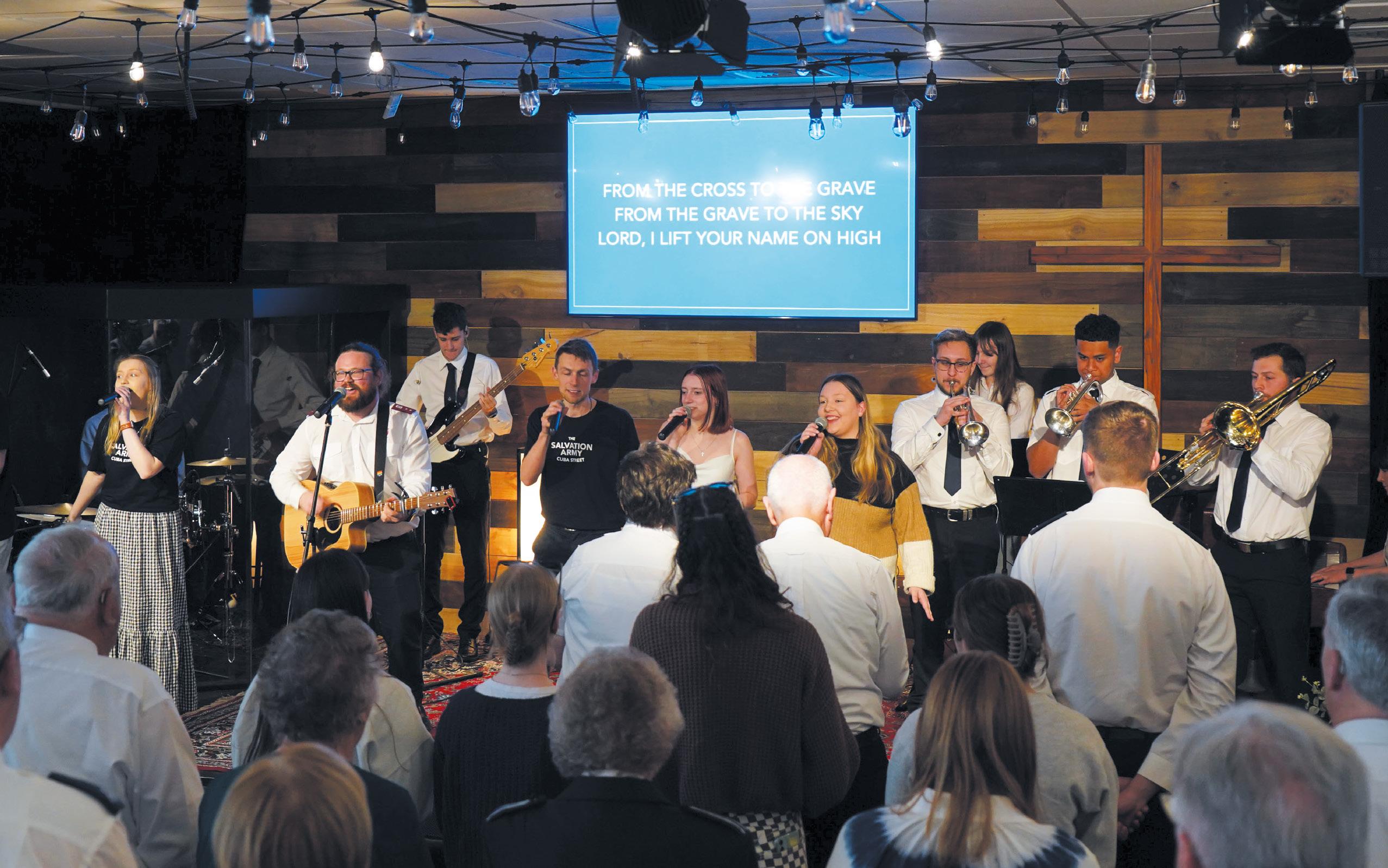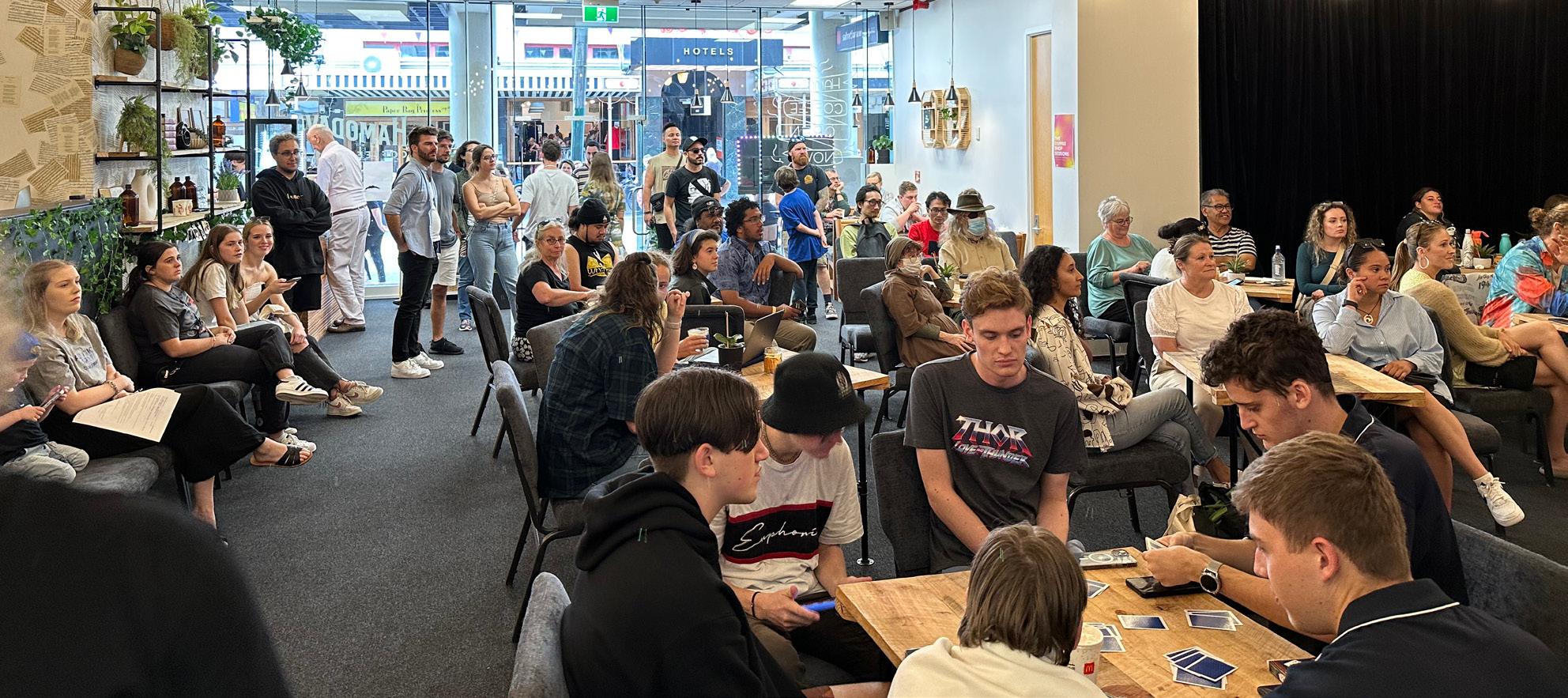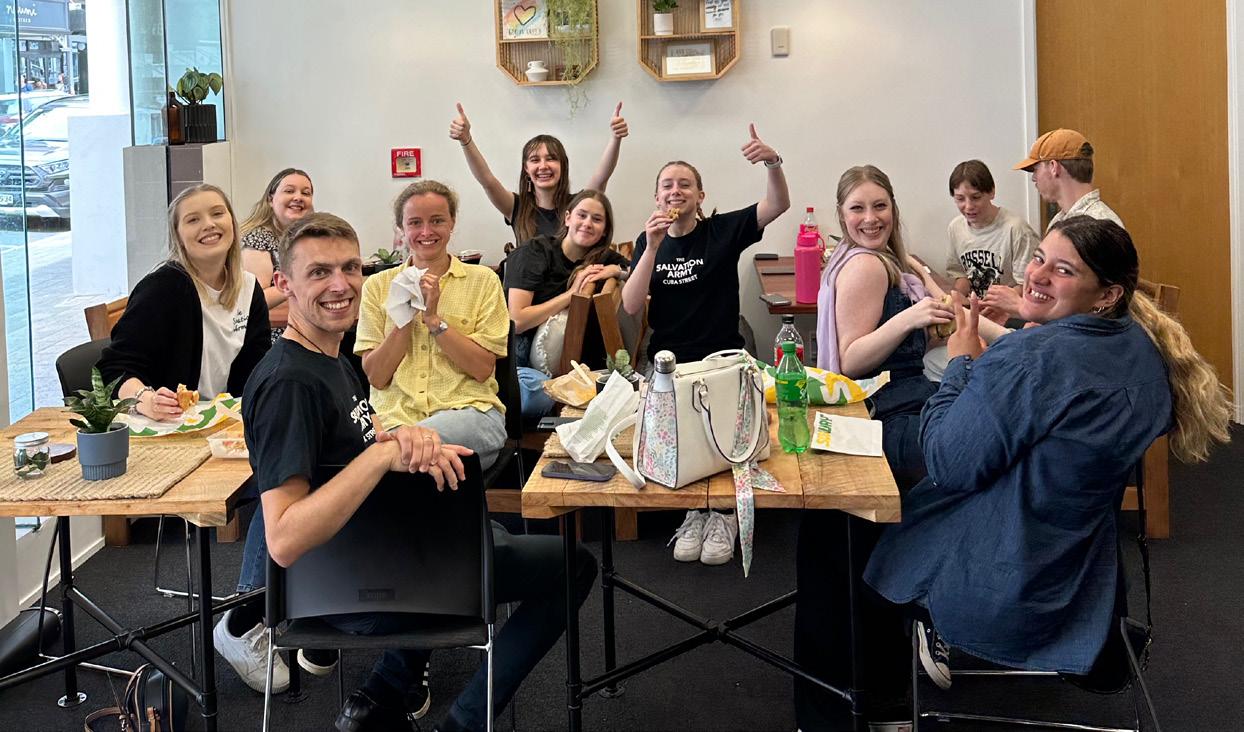
9 minute read
A Door Wide Open to the Future
SALT sat down with Salvation Army Cuba Street members Katrina and Peter Hennessey, and mission officers Captains Daniel and Juanita Buckingham to reflect on the challenges and opportunities of replanting Wellington City Corps. So much more than a simple case of one door closing and another door opening—the corps has a new name, a new location, renewed hope and a revitalised mission, fit for the 21st century.
WORDS Jules Badger
Wellington City Corps was one of the first Salvation Army corps established in New Zealand, in 1883. Fifteen years later, the young corps planted its operations on Vivian Street, in central Wellington. The corps that put down roots in 1896 grew quickly and thrived despite early opposition to the Army’s presence in the city. As Wellington itself grew and developed around them, the corps faithfully preached the gospel and served the community. As the decades passed, generations of Salvationists called Wellington City Corps home, and the corps became renowned for its large, exceptional brass band.
The building that currently stands on the Vivian Street site was designed and constructed in 1990. However, consistent problems with the building culminated in it being deemed no longer safe to use in 2021. But God swung wide a door to an interim solution, and for the first time in over 120 years the corps was on the move.
Mission officer Captain Daniel Buckingham explains that, ‘It was not a question of God politely opening the door and waiting for us to go through, but the Spirit calling out to us from the other side of a wide-open door, “You’re coming through now! This is happening! Come on!” And that was good because there had been lots of great ideas about how to reinvigorate the innercity work of The Salvation Army, and all sorts of reasons why they hadn’t got off the ground. But God was clearly saying, “Now is the time—now is the right time!”’
Generational legacy
Katrina, one of the corps members, was born in 1970 to parents Dixon and Faye McMillan, who had been part of the Wellington City Corps family since the 1960s. Dedicated there as a baby, Katrina’s young faith was nurtured until it bloomed, with the corps being an integral part of her life.
Katrina’s husband Peter, the child of Salvation Army missionary officers Lt-Colonels Don and Lorna Hennessey, arrived at the corps in 1997. The couple was soon married, and for over 20 years served and ministered as faithful church members. Their children Gabriella and Juliana grew up embraced as part of the Wellington City Corps family, just as Katrina had been. Now, as young adults, the girls are both part of the generation leading the freshly replanted Salvation Army Cuba Street. Katrina and Peter are enthusiastic about the replanting of the church and energised by the opportunities, but they first had to embrace the challenge of change.
‘It has been really difficult and we won’t sugarcoat that. There’s no need to pretend it hasn’t been hard. The condition of the Vivian Street building became a huge distraction for us. We’d lost momentum and were struggling to find our way forward as a corps. The mission suffered and so did some relationships. In the end when we were told it was no longer safe to stay in the building, it was a God-send—a relief,’ explains a straight-talking Peter.
‘God had to break us really—it’s been a breaking to open us up,’ says Katrina. ‘Two years ago, I felt quite helpless about the corps. We were stuck. But now there is hope and unity.’
Finding a way forward
Arriving in September 2021, Captains Daniel and Juanita Buckingham knew that challenge and change were ahead. Tasked with leading the replanting of the corps in the inner-city, they had a committed planting team available to them in the people of Wellington City Corps. But the corps was grieving—and fragmented because of the Covid-19 lockdowns.

‘There was a lot of emotion associated with leaving Vivian Street, because this had been the spiritual home of so many for decades. It was clear that people were carrying a lot of pain because they cared so deeply for the corps,’ explains Daniel. ‘There were also those who really wanted to see new initiatives and growth. Overall, most did not want the shutting down of the Vivian Street building to be the end of the corps’ story—the desire to connect and minister to the innercity community was still strong.’
When the lockdowns were lifted, the offer to meet in Pollard Hall (on level one of Territorial Headquarters on Cuba Street) was accepted by the corps. ‘Reflecting on our time in Pollard Hall, it was an important and necessary in-between space from Vivian Street to where we are now,’ explains Juanita. ‘The church needed space to grieve and work through the goodbye to Vivian Street and to heal and regroup.’
Daniel says that the corps took an intentional break from talking about physical spaces. ‘What we needed to talk about as a corps were things like, what kind of people do we want to be? How will we connect with our community? What kind of ministry gaps are there? The kind of facility we needed would flow out of that.’
‘We spent whole Sundays talking through those sorts of questions,’ says Juanita. ‘That work helped us rediscover what church is so we could step into something new together.’

Stepping into something new
Some very clear themes emerged from this process, like being visible and connecting with the community. ‘Concern about what someone who isn’t one of us sees when they walk by or feels when they come in was important to everyone,’ says Daniel.
‘What we might want from a Sunday service, for example, has to come secondary to how we communicate the love of God and the gospel to people who don’t know Jesus. So we must be willing to grapple with things we are doing inadvertently that are creating barriers. Once we make that acknowledgement, we then go one step further into the discomfort of stopping those things or doing something different. Nothing about that is easy. It requires some wrestling, leaving stuff on the altar and trusting God for what comes next. And it requires grappling with the fact that just because we aren’t doing something anymore, it doesn’t mean that thing was bad. It’s likely to have been wonderful and accomplished all sorts of beautiful things in the past and we can celebrate that, while also acknowledging that it’s not working in 2023.’
Caring for one another was also a key theme. ‘We can get so caught up in missional outcomes that we forget that it’s the people who are going to deliver those outcomes,’ says Daniel. ‘If we look after each other and focus on how we treat each other as our first and highest standard, then the rest will happen.’
Being upstairs in Pollard Hall meant swipe cards, lifts and locking doors. ‘We realised quickly that we couldn’t stay up there! We needed to be downstairs where it is easy for people to find us,’ explains Juanita.
The first Sunday meeting in the new cosy downstairs space—with the front door opening right onto the footpath of Cuba Street—took place on Sunday 9 October 2022. ‘The foot traffic past the door is phenomenal,’ says Peter. ‘I love seeing people poke their noses in on a Sunday morning because the music attracts them. There’s such a great feeling in the place now,’ adds Katrina.
Getting out of the way
With 65 percent of the inner-city area populated by 16- to 30-year-olds—mostly students—the mission quickly became clear. ‘When you see a statistic like that as a leadership team, it’s less a decision and more of a conclusion,’ says Daniel.
Making student ministries a key focus for the next few years made further sense because the corps already had a strong core group of young adults. ‘They have quickly become the ones who are the most gung-ho about getting into mission and ministry,’ explains Daniel. ‘The most important thing we can do for this generation as a corps family is encourage their fire and enthusiasm. They have contagious optimism—they believe we can save the world for Jesus today! They’re not just the future of the church, they’re the church now.’
Peter is also excited about who is driving the life and growth of the corps. ‘When I see young people worshipping God, free to be themselves and love and serve each other and reach out to their friends, well that’s where the life of the corps is—the growth. It’s among the young people and I am not getting in the way of that.’
An early indicator of the health for the newly replanted corps is what happens after church. Juanita explains that when they first gathered at Pollard Hall, people left quickly after the service. ‘There was so much pain and people didn’t want to hang around because it was hard. But slowly that began to shift over time. Now church finishes and people hang about longer than the service itself.’
For Peter, hearing positive feedback from some of the older people confirms the direction that corps is heading in. ‘One of our bandsmen shared recently that a few years ago he and his wife were quite ready to step out and move on. But they stayed. And now they don’t want to leave because they love this place and what God is doing. And he was adamant! To me, that says it all about what God is doing.’
From chaos to connection
Peter summarises the last few years as Covid, chaos, change and connection. ‘Recently I looked back and reflected: 2020 was the year of Covid-19; 2021 was the year of chaos—and that is what it felt like in the corps, it was chaotic—but, 2022 was the year of change. We moved to Pollard Hall and changes happened in the corps family in terms of who we were and what we wanted to achieve. Now it’s 2023 and it’s the year of connection. It’s about connecting with each other again, connecting with God together as a corps, and connecting with the Cuba Street community.’











